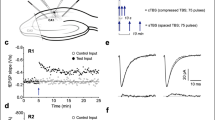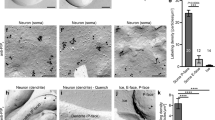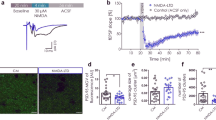Abstract
To investigate the role of phosphatidylinositol 3 kinase (PI3 kinase) in hippocampal synaptic plasticity, we used whole-cell patch clamp recordings from rat CA1 neurons to determine the effects of PI3 kinase inhibitors on long-term depression (LTD). PI3 kinase blockade caused a loss of synapse specificity of LTD that was dependent on the co-activation of NMDA-type glutamate receptors (NMDARs) and metabotropic glutamate receptors (mGluRs), and involved release of Ca2+ from intracellular stores. These findings suggest that the synapse specificity of hippocampal LTD may not be an intrinsic property of this form of homosynaptic plasticity, but rather that it can be regulated by PI3 kinase.
This is a preview of subscription content, access via your institution
Access options
Subscribe to this journal
Receive 12 print issues and online access
$209.00 per year
only $17.42 per issue
Buy this article
- Purchase on Springer Link
- Instant access to full article PDF
Prices may be subject to local taxes which are calculated during checkout


Similar content being viewed by others
References
Kemp, N. & Bashir, Z.I. Prog. Neurobiol. 65, 339–365 (2001).
Bliss, T.V.P. & Collingridge, G.L. Nature 361, 31–39 (1993).
Bear, M.F. Proc. Natl. Acad. Sci. USA 93, 13453–13459 (1996).
Malenka, R.C. & Nicoll, R.A. Science 285, 1870–1874 (1999).
Sanes, J.R. & Lichtman, J.W. Nat. Neurosci. 2, 597–604 (1999).
Osborne, S.L., Meunier, F.A. & Schiavo, G. Neuron 32, 9–12 (2001).
Toker, A. & Cantley, L.C. Nature 387, 673–676 (1997).
Kelly, A. & Lynch, M.A. Neuropharmacology 39, 643–651 (2000).
Raymond, C.R., Redman, S.J. & Crouch, M.F. Neuroscience 109, 531–536 (2002).
Sanna, P.P. et al. J. Neurosci. 22, 3359–3365 (2002).
Daw, M.I. et al. Neuron 28, 873–886 (2000).
Vlahos, C.J., Matter, W.F., Hui, K.Y. & Brown, R.F. J. Biol. Chem. 269, 5241–5248 (1994).
Bortolotto, Z.A. & Collingridge, G.L. Eur. J. Neurosci. 12, 4055–4062 (2000).
Nishiyama, M., Hong, K., Mikoshiba, K., Poo, M-m. & Kato, K. Nature 408, 584–588 (2000).
Acknowledgements
We are grateful to Eli Lilly and Company for supplying LY294002, and to W. W. Anderson for providing the 'LTP' software. This work was supported by the U.K. Wellcome Trust (S.Z. and J.T.R.I.), Medical Research Council (G.L.C.) and Biotechnology and Biological Sciences Research Council (G.L.C. and J.T.R.I.).
Author information
Authors and Affiliations
Corresponding author
Ethics declarations
Competing interests
The authors declare no competing financial interests.
Rights and permissions
About this article
Cite this article
Daw, M., Bortolotto, Z., Saulle, E. et al. Phosphatidylinositol 3 kinase regulates synapse specificity of hippocampal long-term depression. Nat Neurosci 5, 835–836 (2002). https://doi.org/10.1038/nn903
Received:
Accepted:
Published:
Issue Date:
DOI: https://doi.org/10.1038/nn903
This article is cited by
-
PKN1 promotes synapse maturation by inhibiting mGluR-dependent silencing through neuronal glutamate transporter activation
Communications Biology (2020)
-
Effects of PI3Kβ overexpression in the hippocampus on synaptic plasticity and spatial learning
Molecular Brain (2014)
-
Recovery of brain biomarkers following peroxisome proliferator-activated receptor agonist neuroprotective treatment before ischemic stroke
Proteome Science (2014)
-
PI3Kγ is required for NMDA receptor–dependent long-term depression and behavioral flexibility
Nature Neuroscience (2011)
-
A systematic investigation of the protein kinases involved in NMDA receptor-dependent LTD: evidence for a role of GSK-3 but not other serine/threonine kinases
Molecular Brain (2009)



